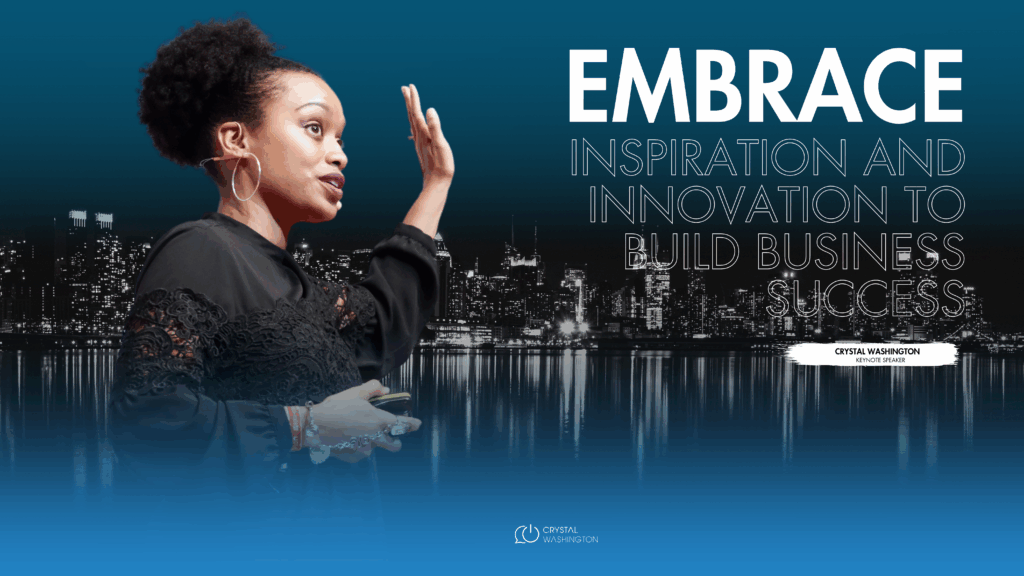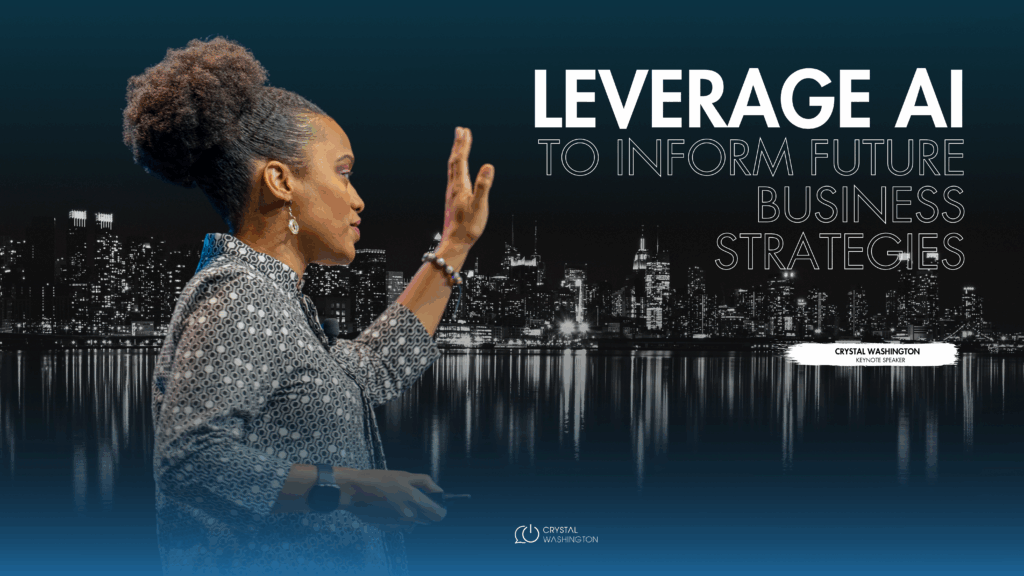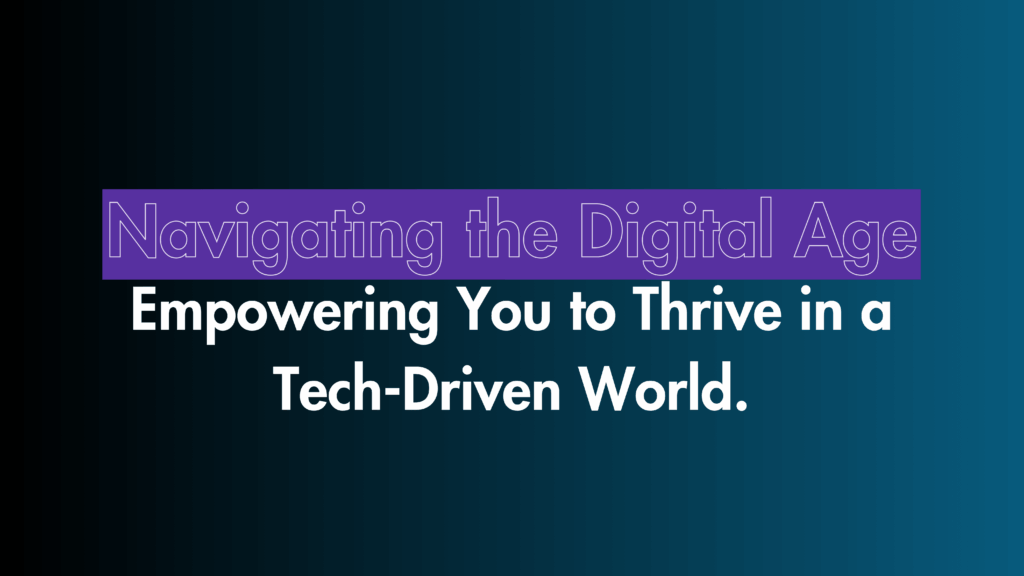April 22, 2020
Transcript
Crystal Washington: Hello, I’m Crystal Washington, Technology Strategist, and Futurist
Karen McCullough: and I’m Karen McCullough, the millennial evangelist who helps you deal with change. And today we want you to rethink it forward, and today we want you to rethink it forward.
Crystal Washington: and by rethinking it forward, we mean that there are things that have worked for all of us in the past that probably aren’t going to work for us in the future. And if we’d be really honest, they’re not even working for us right now.
Karen McCullough: Well, today we’re going to talk about the generations, which is my favorite topic, but we’re going to talk about them in regards to how well they’re doing on this social distancing or this physical distance, and you can call it what you want, but at the how well are they doing at staying away from others?
Crystal Washington: Yeah. I’m interested in hearing your perspective on this one. Karen.
Karen McCullough: I had a ball. I really have had a ball doing the research and then Easter Sunday came and as I walked through my neighborhood, I’ll tell you what I saw.
I saw baby boomers breaking the law. Okay. I saw Easter egg hunts with their baby boomer grandparents hugging little grandchildren. And it wasn’t just one or two homes. It was throughout my walk. So let’s start with the baby boomer. Okay. I am one, but I do believe I have evolved into more of a millennial gen X or, but anyway, that’s another whole story. Baby boomers born between 1946 and 1964. They’ve been through a lot. They think that they are resilient because they’ve been through Vietnam, they’ve been through, Oh so many recessions. Right? They’ve been through many, many crisis with our health. Right. And they’re still standing. And so, um, I think a lot of them haven’t really taken this. I mean I think that they like maybe they think they take it seriously, but they’re not shopping. The studies show that they’re still out there shopping and some of them are not wearing masks.
So I would say, but I wouldn’t want to do a scorecard. You get baby boomers now, those of you that are, I don’t want to hear from you or I do and you can tell me you are, but this is like overall what’s going on.
Crystal Washington: Karen?
Karen McCullough: Yes.
Crystal Washington: Do you know of my baby boomer parents did?
Karen McCullough: I don’t know what I want to hear.
Crystal Washington: They recently got back from a cruise, Karen, they went on a cruise with the information coming out about Covid-19!
Karen McCullough: I’m, so this is your parents?
Crystal Washington: My, my parents, the people who made me, okay?
Karen McCullough: Are they watching this video?
Crystal Washington: they could be. And of course, they came back, their jobs quarantined them for two weeks so they couldn’t come back to work. I love baby boomers, but, and again, not everyone, like you said, it’s not everybody, but, and in talking to my friends, we’re all having the same experience where it’s really, really hard to get our parents to take this seriously, which is crazy because they’re one of like, technically they’re the most vulnerable population.
Karen McCullough: So, but I think baby boomers like to give advice. I think that baby boomer parents, you know, they like to be parents and they like to tell you what to do. They’re very much think about all the years, all the decades that they’ve been in control. And I believe that, I believe they’re laughing at this. And you know, when I, when I, cause I do wear my mask out and I see a lot of baby boomers that don’t have their mask on. And I think that they just think that they can tough this out. I’m not really sure what they think. Um, I think a lot of baby boomer men, no offense guys, but they’re a little more macho and they’re not going to do some of these things. I don’t know what it is. So maybe we’ll, once you get a D on this one. Okay. I thought I’d move on.
Crystal Washington: Tell us in the comments why you’re doing what you’re doing. I’m, I’m genuinely, I’m trying to understand, but you say we’re moving on? Who’s next?
Karen McCullough: Okay. So this when I’m doing my keynote, this is, I make, I have a lot of fun with gen X. So these are people that were born between 1965 and 1979 and they’re like the sandwich generation, right? They’re sandwiched in between the baby boomer and the millennial to most of self-absorbed generations. And then you’ve got these gen Xers in the middle who are very, very practical. They are very much, um, in control. Not only do they have to, uh, monitor and help yell at their baby boomer parents, but they’ve also got little kids at home. So this is a generation that thinks that they were cut out for this, that this, this social distancing is like their thing. Because I don’t know if you all remember that. We called them baby boomers. We did this, we call them the latchkey kids, right? And they feel like they have spent their whole life in isolation. People forget that they’re even a generation. CBS just did a report on the generations and they, they totally left gen X out. Oh no. Ooh. So gen X, I love you. And I love the way you are taking this very, very seriously because your kids want to go out, you know, your kids want to be social and you have got to manage your parents and were kids. So you’re still stuck in the middle.
Karen McCullough: Do you have anything on gen X?
Crystal Washington: Yeah, I actually think gen X is probably doing the best out of anybody when it comes to social distancing. I think they’re the ones who are really practicing what they preach. Almost to a point where it seems slightly insane. So I just, I’m a millennial and I happened to be married to a gen-x. All right? We had to go to the grocery store the other day and my husband, um, do you want to know what my husband made me wear?
Karen McCullough: Oh, I’m dying to see this. Yeah, I’m going to take a picture of that… {laughing}
Crystal Washington: No, you’re not. Get a screenshot from the video. {laughing}
Karen McCullough: You a millennial did that? What do you get? Any crazy looks? Put it up again. I’ve got to see it. Please.
Crystal Washington: Okay.
Karen McCullough: {laughing} I need one of those. If I ever have to get on an airplane.
Crystal Washington: Oh yes, we got some interesting looks. The good thing is we were at the grocery store and most people had on masks, but not those kinds of masks. You know, they had on the little, it wasn’t even the N95 mask. They had on just a little, you know. Um, but that is my gen-x husband and he’s serious and, and he wants to keep us safe and we have matching ones. So we, if you see two people walking around with a lot of hair and two masks and you can’t see our faces, it would be me and my husband.
Karen McCullough: Well, he’s a great guy. I know. And he probably wants to keep his mother safe. I know that he loves her and yeah, right. I think that that’s what I’m seeing with my gen X kids. They worry about me finally and they want to keep me safe. They brought a bike over from me, so I get to ride my bike through the neighborhood. But, uh, anyway, hope I don’t fall. So let’s move on. So, this is kind of funny. So the millennials born between 1980, millennials, millennials, and a 1997. And here’s the thing, we, baby boys in the media, we blame millennials for everything no matter what. What’s going wrong. It’s those millennials that did it right? You’re blamed for the guys with their little beards. You ended the razor business. So it was millennials. They don’t drink normal beer. They drink the little IPA beer. They ruined the beer business for Coors. Right? Um, they ruined everything. They don’t use soap anymore. They use the little pump bottle lotions. If they don’t use paper napkins, they use paper towels. And no matter what, whatever is declining, it’s the millennials fault. Yeah. So, so they blame when we saw those kids on the beach, way back during spring break, what did we say? We said those darn millennials around the beach, and they weren’t millennials. They were gen Z, which we’ll get to in a second.
Crystal Washington: No. I was going to say that that certainly was not us at the beach. We are the generation that’s fighting with our parents to stay home. Our boomer parents, we are tagging along with our gen X siblings, trying to get everyone in line and telling our children, nieces, and nephews to stay off the beaches. So that most certainly was not the millennials.
Karen McCullough: What I was reading an article and it came out and it was written by one of the people in the government and they’re counting on millennials. They said, the millennials are so great with, with social media that they have to start putting out there, be safe, and they are doing it and they’re, I know that we love gen X, but they’re actually saying that the millennials are the best when it comes to social distancing. And I think it’s because there’s so many of them. There’s like over 80 million millennials out there and if millennials can be very pro, this social distancing, it’s going to make the biggest difference. Thank you. Thank you millennials. We’re not blaming you. Yeah. And now let’s move on to those college kids on the beach. We call them gen Z and I want you to think about this generation as the beginning of a generation.
Karen McCullough: So the people that were on the beach were kids in college from eight age 18 to 23 okay. And they are gen Zs and there’s, I’m not going to defend them, but I’m going to have you think back to when you were in college. Think back to spring break thing. Back to you bought a ticket, an airline ticket. You’re going to go to either California or Florida to the beach, and then this thing comes out that there’s a virus out there and people are saying that it doesn’t affect kids in the very beginning. It’s really more for the elderly and you want to go to the beach. What would you do? I’d probably go to the beach. What about you crystal?
Crystal Washington: Yeah, I’m thinking back to me at that age, I don’t know what I would have done, but what I do know, it’s not a clear cut case. No. When you’re that young, you’re, you’re not really thinking about everything. And you don’t necessarily take serious things seriously. And it’s not that you don’t care, it’s just you think you’re invincible and you think, thank you,
Karen McCullough: I get it. I think that you think you’re invincible. So let’s give him a break. Let’s stop blaming. I know we’ve had fun poking at the generations and my, my, my whole idea right now is to stop all the blaming to actually begin to help people. So when the news came out, and I know this from some of my nieces and nephews, when they realized that they could bring the virus home to their grandparents and to their parents, they got scared. And so now we see a lot more seriousness and a lot of them social distancing. I think how hard it is because that generation goes all the way down to like eight-year-olds. So think of how little kids are missing their friends right now. So I think we all have to open up our hearts. I think that we all have to realize that we’re all in this together and that we need to social distance, physical, different distance, whatever you want to call it. And I think we need to just love each other more and be kind.
Crystal Washington: Aw, I like that.
Karen McCullough: Well, that’s where I am today. So I’m spreading kindness because I love the generations. I love talking about them. I love laughing about them. But in the end, we’re all in this together, so let’s all stay safe, and let’s be healthy.
Crystal Washington: All right, well, we’ll see everybody on Friday.




